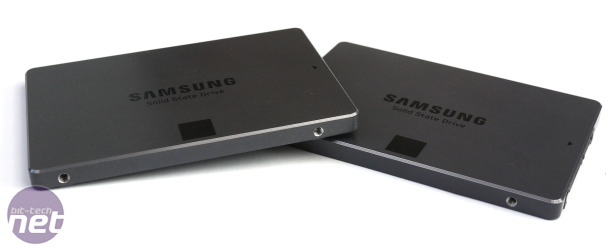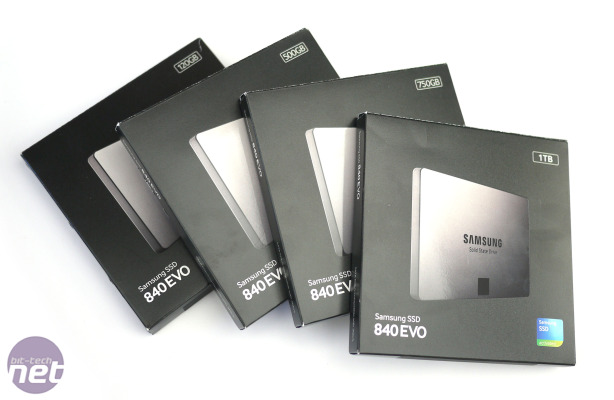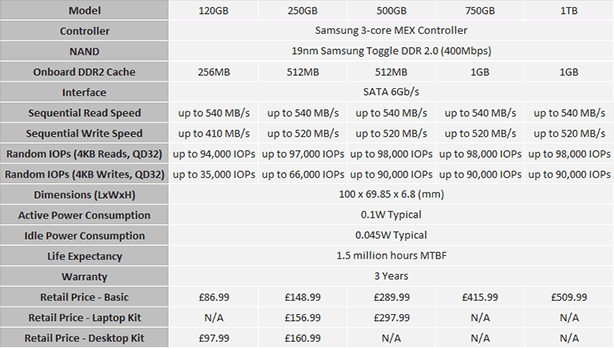
Samsung SSD 840 Evo 120GB, 500GB, 750GB, 1TB Review
Manufacturer: SamsungUK Price: £86.99 (120GB), £148.99 (256GB), £289.99 (500GB), £415.99 (750GB), £509.99 (1TB)
It’s fair to say the Samsung SSD 840 and Samsung SSD 840 Pro ranges caused something of a stir when they arrived earlier this year. Offering class-leading speeds and competitive pricing, both instantly shot to the top of the charts, with the 840 Pro being the choice for heavy duty work and the 840 the top mainstream option.
Now Samsung is back with a new addition to the 840 range in the shape of the Samsung SSD 840 Evo. This replaces the non-Pro 840, offering greater capacities and higher transfer speeds, with particularly high gains for the low capacity drives. However, it still leaves the 840 Pro as the premium product in the 840 series.

The reason for this is, if you recall from our review of the SSD 840 and SSD 840 Pro, the principle difference between those two drives is that the 840 uses 3-bit NAND cells (TLC), whereas the SSD Pro uses 2-bit NAND (MLC). This extra bit allows the former drive to store twice as much information in the same amount of space but also brings with it greater complexity, which is why the drive is slower (and has a shorter lifespan too). The new Evo line uses this same type of NAND but by utilising a raft of new tricks it has markedly improved performance.
Before we look deeper at those changes, the first thing to note about the SSD 840 Evo is that it uses NAND manufactured on a new smaller process, moving from 21nm to 19nm. That may not sound like a huge difference but it has allowed Samsung to offer the Evo range in sizes up to 1TB, doubling the previous highest capacity in the 840 series. This alone is cause to sit up and pay attention as, along with the Crucial 960GB M500, this means we are finally seeing SSDs get to the point where they can become not just a boot drive but a full system drive, at least if your media collection isn’t too large.
There is a downside to a smaller manufacturing process, though, which is that as the process shrinks so the lifespan of the NAND is reduced. This is due to the oxide layers that trap electrons in the NAND also becoming smaller, and it’s these layers that wear out overtime. However, Samsung has put a great deal of effort into reducing the impact of this, to the point where the Evo drives still come with a three year warranty like the 840 before (the Pro has a five year warranty).
This also explains the rounded-number capacities of the drives, with 120GB rather than 128GB and 250GB rather than 256GB, etc. This is down to a higher proportion of NAND being set aside for wear levelling and other housekeeping duties, as compared to the Samsung SSD 840 Pro, for instance, which is actually rated as a 128GB drive.

Moreover, recent torture tests on the existing 840 series showed that it could survive 3,152 write cycles totalling 745TB of data before errors occurred. Taking into account an average user write amplification factor (the difference between the write commands sent to the SSD and the actual number of writes executed internally by the SSD) of 3 and assuming an overly-high average of 30GB of writes per day, this means the drive would last 24 years. Although this may be reduced slightly by the reduction in manufacturing process geometry it is still likely the average drive will outlast any typical system build.
So, thanks to this new NAND, the Samsung SSD 840 Evo range is available in sizes of 120GB, 250GB, 500Gb, 750GB and 1TB. As you'd expect, performance drops the lower the capacity of the drive but what's notable is how much less it drops compared to previous generation drives. This is where the real trickery of the Samsung SSD 840 Evo range comes in...
SSD 840 Evo Specs


MSI MPG Velox 100R Chassis Review
October 14 2021 | 15:04








Want to comment? Please log in.